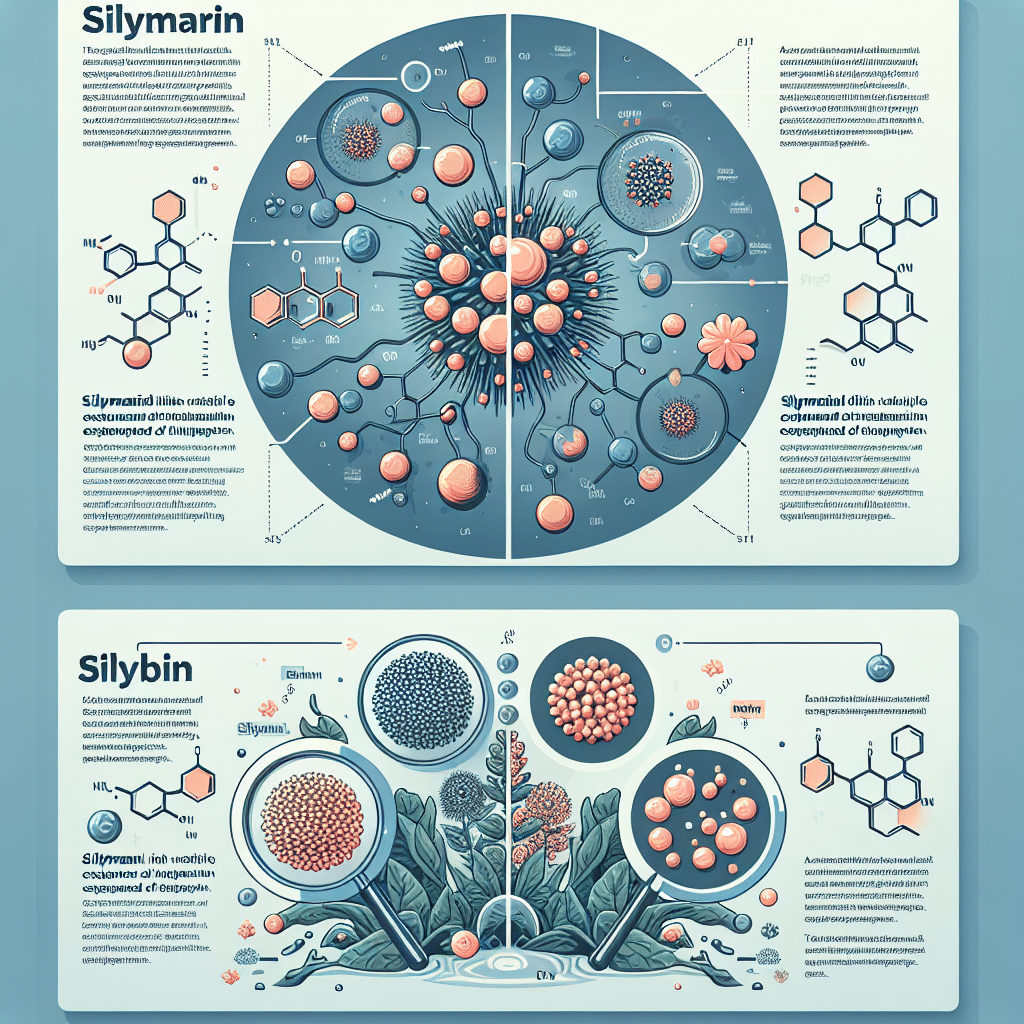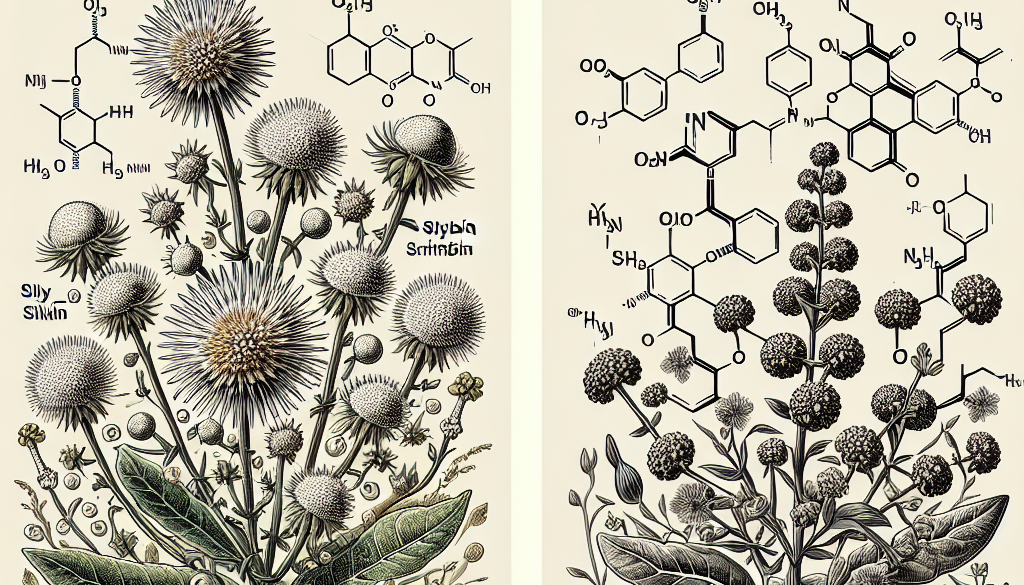Difference Between Silymarin and Silybin
-
Table of Contents
- Silymarin vs. Silybin: Understanding the Distinct Liver Protectors
- What is Silymarin?
- What is Silybin?
- Comparing Silymarin and Silybin
- Chemical Composition and Potency
- Availability and Absorption
- Therapeutic Applications
- Research and Studies
- Case Studies and Statistics
- Choosing Between Silymarin and Silybin
- Conclusion: Key Takeaways on Silymarin and Silybin
- Support Your Liver Health with ETChem’s Protein Products
Silymarin vs. Silybin: Understanding the Distinct Liver Protectors

The liver is a vital organ responsible for numerous functions in the body, including detoxification, protein synthesis, and the production of biochemicals necessary for digestion. Given its importance, it’s no surprise that many seek to support liver health through dietary supplements. Among the most popular are those containing silymarin and silybin. While these two compounds are closely related, they are not identical, and understanding their differences is crucial for anyone interested in liver health.
What is Silymarin?
Silymarin is a flavonolignan complex extracted from the milk thistle plant (Silybum marianum), which has been used for over 2000 years as a natural remedy for liver and gallbladder disorders. The complex is composed of several related compounds, including silybin, isosilybin, silydianin, and silychristin. Silymarin is widely recognized for its antioxidant, anti-inflammatory, and hepatoprotective properties. It is commonly used to treat liver diseases such as cirrhosis, jaundice, hepatitis, and gallbladder disorders.
What is Silybin?
Silybin, also known as silibinin, is the most active component of the silymarin complex and is largely responsible for its beneficial effects. It is a potent antioxidant that protects liver cells from toxins and oxidative stress. Silybin also stimulates liver regeneration by promoting the synthesis of proteins and creating new liver cells. Additionally, it has been shown to have antifibrotic properties, which can help prevent the progression of liver diseases.
Comparing Silymarin and Silybin
Chemical Composition and Potency
The primary difference between silymarin and silybin lies in their composition. Silymarin is a complex containing several compounds, with silybin being the most active and abundant. Silybin itself can be isolated from silymarin and used in a more concentrated form. This concentration often leads to a higher potency in terms of antioxidant and hepatoprotective effects.
Availability and Absorption
When it comes to bioavailability, silybin has an edge over silymarin. The body more readily absorbs silybin, especially when it is formulated with phospholipids (as in silybin-phosphatidylcholine complex). This formulation enhances its solubility and uptake by the liver cells. Silymarin, being a complex, may not be absorbed as efficiently, which can affect its overall efficacy.
Therapeutic Applications
Both silymarin and silybin are used for liver protection and treatment of liver diseases. However, due to its higher potency, silybin is often preferred for more targeted therapeutic applications. It is used in clinical trials for conditions such as alcoholic liver disease, non-alcoholic fatty liver disease (NAFLD), and liver damage caused by toxins.
Research and Studies
Extensive research has been conducted on both silymarin and silybin. Studies have shown that silymarin can effectively protect the liver from various toxins, including alcohol and certain drugs. Silybin, on the other hand, has been the subject of more focused research due to its potent activity and has shown promise in treating liver diseases at a cellular level.
Case Studies and Statistics
Several case studies and clinical trials have demonstrated the effectiveness of both silymarin and silybin in treating liver conditions. For instance, a study published in the “World Journal of Hepatology” found that silymarin significantly improved liver function in patients with alcoholic liver disease. Another study in the “Journal of Hepatology” reported that silybin, particularly when combined with phosphatidylcholine and vitamin E, improved insulin resistance and liver enzymes in patients with NAFLD.
Choosing Between Silymarin and Silybin
When deciding between silymarin and silybin supplements, consider the following factors:
- Potency: If you are looking for a more potent supplement, silybin may be the better choice.
- Condition: For general liver health, silymarin may suffice, but for specific liver conditions, silybin could offer more targeted support.
- Formulation: Look for supplements that enhance the bioavailability of silybin, such as those combined with phospholipids.
- Quality: Ensure that the supplement is of high quality and from a reputable manufacturer to guarantee purity and efficacy.
Conclusion: Key Takeaways on Silymarin and Silybin
In summary, while silymarin and silybin are closely related, they are not interchangeable. Silymarin is a complex that includes silybin, and it is beneficial for general liver health and protection. Silybin, being the most active component of silymarin, offers a more concentrated and potent option for those needing targeted liver support. Both have been backed by research and clinical studies, but silybin’s higher bioavailability and potency make it the preferred choice for specific therapeutic applications.
Support Your Liver Health with ETChem’s Protein Products
If you’re looking to support your liver health, consider incorporating high-quality protein products into your diet. ETChem offers a range of premium protein products that can complement your liver health regimen. Their extensive selection includes marine collagen, fish collagen, bovine collagen, and various types of collagen that are easily absorbed and beneficial for overall health. By choosing ETChem’s protein products, you can ensure that you’re getting the highest quality supplements to support your liver and overall wellness.
About ETChem:
ETChem, a reputable Chinese Collagen factory manufacturer and supplier, is renowned for producing, stocking, exporting, and delivering the highest quality collagens. They include marine collagen, fish collagen, bovine collagen, chicken collagen, type I collagen, type II collagen and type III collagen etc. Their offerings, characterized by a neutral taste, instant solubility attributes, cater to a diverse range of industries. They serve nutraceutical, pharmaceutical, cosmeceutical, veterinary, as well as food and beverage finished product distributors, traders, and manufacturers across Europe, USA, Canada, Australia, Thailand, Japan, Korea, Brazil, and Chile, among others.
ETChem specialization includes exporting and delivering tailor-made collagen powder and finished collagen nutritional supplements. Their extensive product range covers sectors like Food and Beverage, Sports Nutrition, Weight Management, Dietary Supplements, Health and Wellness Products, ensuring comprehensive solutions to meet all your protein needs.
As a trusted company by leading global food and beverage brands and Fortune 500 companies, ETChem reinforces China’s reputation in the global arena. For more information or to sample their products, please contact them and email karen(at)et-chem.com today.




